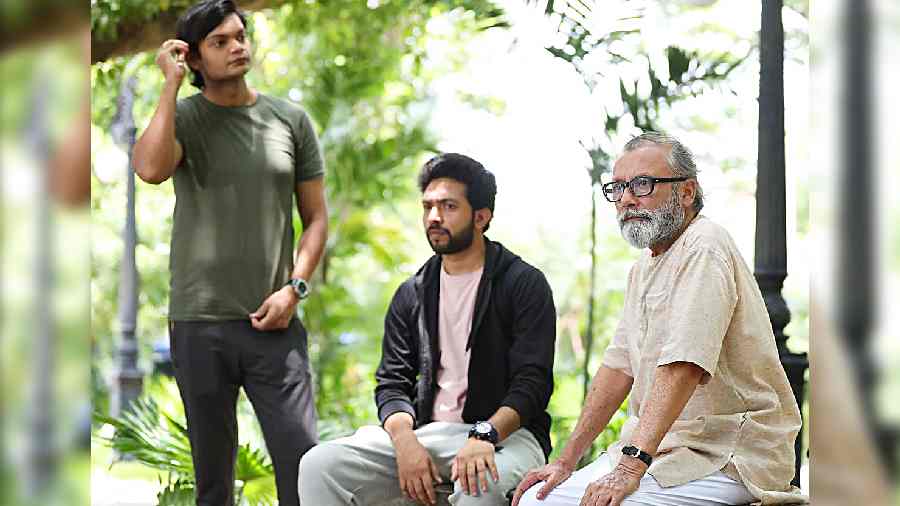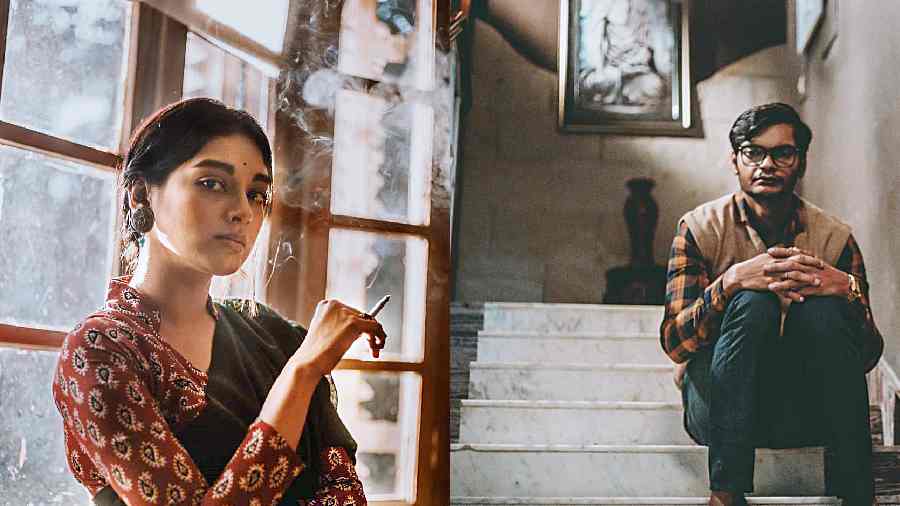Debopriyo Mukherjee is soaking in the praise coming his way for his performance in Abani Sen er 7 No. Case. “The feedback has been good so far, in fact, it’s been better than expected. Ours is a Bengali show streaming on a national OTT platform (MX Player) so the expectation was that we’d get buried under the Hindi original content on the platform. To our surprise though, we made it to the trending and top-picks sections. I think the performances from the cast, the concept and the story are what the audiences have really taken a liking to,” said Debopriyo. The Telegraph chat.
What’s been your fave compliment?
That I have been able to create a detective who defies all the conventions and stereotypes of the genre, while also getting the audience to invest in Abani Sen emotionally. It came from someone who has directed me several times so it’s become a trophy of sorts to me. However, I believe this compliment belongs to the writer and director of the show, Neil Nawaz. I was merely his instrument.
Who is Abani Sen?
The guy next door, the one struggling every day to overcome his failures. He doesn’t get a second look from people when he walks down the street, he evokes no sense of confidence. A loner who has lost everyone he used to love and now actively hides from the rest of the world. His only reason to wake up every morning, his purpose, is to prove that he is his father’s ideal son. He wants to continue his father’s legacy. The legacy of a highly respected and sought-after detective.
How is Abani Sen different from other detectives?
There is no heroism attached to Abani. Quite the opposite — he is a bit of a bumbling buffoon. Most iconic sleuths from Bengali literature inspire fanfare, quite rightly their representations on screen are also quite grand and they are portrayed by actors who epitomise screen presence. Abani on the other hand is meek, lacks confidence and at best evokes a sense of sympathy. Especially as the chapters of his life start to unravel. While most detective stories are of the hero bringing down the villain, of good vs evil, Abani’s is an underdog story where the core is a simple man’s battle against his own demons.
What was your first reaction when you were approached to play him?
Neil first narrated the story to me and I loved it. I loved the character of the antagonist which is what I assumed Neil wanted me for. I was pleasantly surprised when he said he wanted me to play the titular character. Needless to say, I jumped at the opportunity.
How did you prepare to play him?
I isolated myself. I can’t explain why without giving away spoilers, but Abani’s isolation plays a big part in the scheme of things. But I also wanted to incorporate a certain childlike innocence in him. In my mind, being just a beaten man was not going to be enough, there had to be a reason why audiences would root for him. So I performed certain exercises just to bring back those core memories of my childhood. In certain aspects, Abani’s character is already very similar to mine, some of his struggles hit a little too close to home for comfort but in the end that added to my performance, I hope.
Tell us about your look in the film.
The look was designed by Aheri Mukherjee, who was also our associate director. In fact, Aheri was the one who pushed Neil to consider me. We knew we wanted Abani to be very ordinary visually. He could walk past you on the street, sit next to you on the subway and be any one of the faces in the crowd.

A moment from Lost
What’s the storyline?
Dakshinaranjan Sen was a famous detective around 20 years ago. His deduction skills and spotless record had made him a household name, a name that all criminals feared. As a youngster, Abani Sen grew up on the tales of his father’s heroic adventures, narrated to him by his thamma. Since a very young age, he aspired to be a successful detective like his father. Because of his lineage, he even managed to pick up a few cases, six to be precise. However, he failed to crack even one of them. Since then, he has become a laughing stock of sorts. Fate gives him one last chance to redeem himself, when he is handed the responsibility of investigating the death of a well-known industrialist’s wife — Monoroma Bagchi. Whether or not he manages to crack the case and the hurdles he encounters on the road to his redemption is what forms the crux of the story.
How was your shooting experience?
We shot the series independently, with no big banner behind us, and no pre-approval from any OTT platforms. Needless to say, we encountered a lot of difficulties. But we had a young team, led by debutant director Neil Nawaz. He took the pressure upon himself while ensuring that the rest of us had a relaxed atmosphere to shoot in. Owing to the limited scale and small cast, we had practically become a family.
Who are you in Lost?
I play Shaqeel in the film. I can’t reveal too many details but Shaqeel and Thakur are two characters who appear together at various situations throughout the film. There’s a certain discomfort and sense of doom that their presence evokes. Why they do what they do and what their true purpose is, can only be discovered upon watching the film.
How was it like sharing screen space with Pankaj Kapur?
I was cold, numb even when he walked into the location. Here’s a man whom we have grown up watching and learning from. Now, we are supposed to perform with him. Both me and Yogesh, who plays Thakur in the film, were extremely nervous. But then we exchanged pleasantries with Pankaj sir and he immediately put us at ease. He is very meticulous about every aspect of his performance, hence he and Tony sir both insisted that we rehearse the scene multiple times. Those rehearsals put us at ease somewhat. After the shot he told Tony sir: “Bachcho ne badhiya kaam kiya hai.” For both me and Yogesh, that was nothing short of winning a golden statuette.
What was your state of mind on the day you were supposed to shoot with Pankaj Kapur?
Had I been put in a tub of milk, I could have churned it into butter, I was that nervous. He is an icon! On one hand, I was thanking all the stars that aligned to bring me to that moment, on the other, I was nervous. About meeting one of my idols, more importantly, sharing a scene with him. I knew my character, I had done my homework, but at such moments, it feels like the brain has just stopped working. Thankfully, Tony sir was happy at the end of the scene. Pankaj sir complimented us. What more could we have asked for?
Did you get time to talk to him when you were not shooting?
Not really. We had started shooting right after one of the lockdowns so given his seniority, Pankaj sir was extremely cautious about staying in a bubble for the most part. Plus, frankly speaking, I never asked to meet him either. The idea of standing in front of him, trying to make small talk or asking him to pose for a picture felt downright preposterous and very intimidating.
How did it feel being directed by Aniruddha Roy Chowdhury?
Tony sir is an institution and is absolutely hands-on. He is very precise about what he wants from his actors and he acts it out in detail, at the same time he patiently explains the logic behind his line of thought so that we as actors have no trouble committing to what we are doing. Sometimes he also pushes for variations. Most importantly, prior to the commencement of shoot he held workshops with all of us. That was what helped us the most. He doesn’t just instruct his actors, he empathises with them. He is a brilliant actor himself so he understands how actors think. That can be such a huge cause for comfort for actors. I also had the privilege of interacting with him after pack up, because we were staying in the same hotel during our outdoor schedule. He is also one of the kindest people I have ever met, an absolute gentleman.
Any lessons learnt from the experience?
Plenty. First, the scale of production of a Hindi film like Lost is much bigger than what we are used to as a regional industry, with valid reasons though. Plus when you are working with actors like Yami Gautam and Pankaj Kapur, being directed by Aniruddha Roy Chowdhury, being shot by Avik Mukhopadhyay, every minute spent on set is a learning experience.










